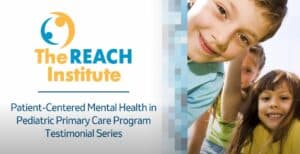When parents’ mental health affects children
- January 23, 2024
- The REACH Institute
- Parents, Patient communication, Pediatric primary care

One in 14 children has a parent or other caregiver who reports poor mental health. Considering many may not report symptoms, the true number clinicians see in their practice is likely much higher. Research consistently shows that parents’ mental health issues can negatively affect children’s physical, mental, and emotional health.
“When we’re thinking about children’s mental health, we’re also thinking about the health of the family unit,” explains Alyx Holden, MD. “In order for children’s neurobiology to develop, they need the support and context of healthy caregivers.”
Pediatric primary care providers are in a unique position to step in and support both children’s and caregivers’ mental health. To learn more about how clinicians can identify parents’ mental health challenges and respond effectively, we spoke to REACH faculty members Alyx Holden, MD, and Roxanne Swiegers, MD.
Signs of parents in need
Recognizing signs of mental health issues in caregivers can mean earlier treatment and better outcomes. While some parents may self-report or voice concerns about another caregiver, clinicians should also remain alert for changes that may indicate mental health challenges.
For example, changes in weight, hygiene, odors (alcohol, cigarettes, marijuana), or who brings a child to the appointment may all be indicators. Parents’ and children’s interactions in the office may shift, for example, behaviors like eye contact and physical contact, or how the parent reacts if the child acts out.
Look beyond the caregiver at the appointment
New research suggests that fathers’ mental health has a vital, and complementary, impact on children’s development, alongside mother’s mental health. However, fathers are less likely to attend office visits, and much of the research and training to date has emphasized mothers’ mental health.
Clinicians can use tools like Zoom to more easily bring parents together for their child’s wellbeing. This is especially helpful if parents are separated or divorced. A three-way phone or Zoom call also gives clinicians the chance to observe the parents’ interactions, educate them on how their relationship and mental health affect their child and prevent misunderstandings.
Children’s mental health affects parents too
“When a child presents with a mental health concern, we immediately need to look at the parents’ mental health as well,” shares Dr. Swiegers. This is important both for treating the child and because children’s mental health concerns can trigger parents’ conditions.
Caring for a child with any illness, including mental health, requires significant time, energy, and money. Parents may feel guilt and embarrassment and may worry about the future. Dr. Holden advises that, “you have to be so much more attuned to parents at those times of stress.”
Talking to parents about their mental health
As with children’s mental health, creating an environment that normalizes mental health conversations is essential. Clinicians can:
- Put up posters that say: “We will talk to you about mental health.”
- Start appointments by discussing how important adult support is for children’s wellness and development.
- Acknowledge that parents are both caregivers and independent adults with their own challenges.
- Prepare ready-made resources to share, such as helpful websites, referrals to counselors, and patient literature on specific topics.
When a parent self-reports or the clinician observes signs of potential mental health conditions, Dr. Swiegers recommends using a modified LEAP approach to motivational interviewing. This is similar to what is taught in REACH’s Patient-Centered Mental Health in Pediatric Primary Care (PPP) course.
- Look and observe what is happening. Listen actively to the parents and child when you share your observations.
- Empathize with the difficulty of what they are experiencing. Engage the parents in your shared mission to care for their child. Educate them about research like the Adverse Childhood Experiences (ACEs) study and how traumatic events can affect their child’s brain development. But be sure to ask parents’ permission to share your thoughts first!
- Agree that you are all committed to the child’s well-being.
- Partner with parents to determine the changes they can most easily make. Plan for how they will put the changes into practice.
In guiding parents through to a plan, Dr. Swiegers suggests leaning into your shared care for the child. “My golden card is the fact that we all care about this child. Even the worst parent cares about this child.”
RESOURCES
- For more about new research on paternal mental health and childhood development, check out this useful summary and the full paper published in Frontiers in Psychology.
- Research compiled by the CDC delves into how parental mental health issues affect children’s health, including more about the impact of Adverse Childhood Experiences.
- Prior mental health articles from The REACH Institute also provide resources, including how to help families dealing with holiday stress and parents with mental health issues.
Categories
- ADHD
- Anti-racism
- Anxiety
- Assessment & screening
- Autism
- Child mental health
- Coding
- Cognitive behavioral therapy
- College transition
- Culturally responsive
- Depression
- Eating disorders
- Foster care
- Grief
- High-risk children & youth
- LGBTQIA
- Medication
- Parents
- Patient communication
- Pediatric primary care
- School refusal
- Sleep disorders
- Suicide
- Trauma
- Show All Categories
Register for courses
“The REACH Insitute Video Testimonial: Priya  ”
”
